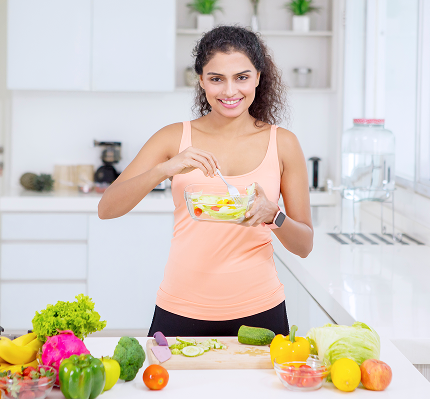10 Essential Nutrition Tips for a Healthy Pregnancy

Pregnancy is a journey of love, transformation, and responsibility. As your body nurtures new life, the food you eat becomes more than just fuel—it becomes the foundation for your baby’s growth and your own health. Proper nutrition during these nine months can reduce complications, ease discomfort, and give your little one the best possible start.
1. Eat a Balanced and Colorful Diet
A healthy pregnancy diet is all about balance. Your meals should include:
- Fruits and Vegetables: Rich in vitamins, minerals, and fiber. Aim for at least 5 servings daily.
- Whole Grains: Brown rice, oats, quinoa, and whole wheat for sustained energy.
- Lean Proteins: Eggs, chicken, beans, and lentils to support your baby’s growth.
- Healthy Fats: Nuts, seeds, and avocados for brain development.
Tip: Think of your plate as a rainbow—the more colorful, the more nutrients you’re providing.
2. Don’t Skip Folic Acid
Folic acid is a pregnancy super-nutrient. It helps prevent neural tube defects and supports your baby’s brain and spinal cord.
- Food Sources: Spinach, broccoli, beans, citrus fruits, fortified cereals.
- Supplements: Most doctors recommend 400–600 mcg daily, starting even before conception.
Tip: Begin folic acid supplementation as soon as you start planning pregnancy—it’s most critical in the first trimester.
3. Prioritize Iron-Rich Foods
During pregnancy, your blood volume increases, which means your iron needs almost double. Iron deficiency can lead to fatigue and anemia.
- Food Sources: Lean red meat, poultry, fish, spinach, lentils, chickpeas, fortified cereals.
- Pair with Vitamin C: Oranges, tomatoes, or lemon juice improve iron absorption.
Tip: Avoid drinking tea or coffee with iron-rich meals—they block absorption.
4. Include Omega-3 Fatty Acids
Omega-3 fatty acids, especially DHA, are crucial for your baby’s brain, eyes, and nervous system.
- Safe Sources: Salmon, sardines, walnuts, chia seeds, flaxseeds.
- Avoid High Mercury Fish: Shark, swordfish, king mackerel.
Tip: If you don’t eat fish, talk to your doctor about an omega-3 supplement.
5. Get Enough Calcium
Calcium builds your baby’s bones, teeth, and muscles. If you don’t consume enough, your body pulls calcium from your bones.
- Food Sources: Milk, yogurt, cheese, tofu, sesame seeds, almonds, leafy greens.
- Requirement: Around 1,000 mg/day during pregnancy.
Tip: Pair calcium-rich foods with vitamin D (from sunlight or fortified foods) for better absorption.
6. Stay Hydrated
Your body needs extra fluids to support increased blood volume, amniotic fluid, and digestion.
- Goal: 8–10 glasses of water daily.
- Other Sources: Fresh fruit juices, soups, coconut water, herbal teas.
Tip: If plain water feels boring, infuse it with lemon slices, cucumber, or mint.
7. Don’t Forget Protein
Protein is called the building block of life for a reason—it helps build your baby’s muscles, tissues, and organs.
- Food Sources: Eggs, chicken, fish, beans, lentils, tofu, nuts, dairy products.
- Requirement: About 70–75 grams/day during pregnancy.
Tip: Include a protein source in every meal—this also helps reduce pregnancy fatigue.
8. Limit Processed & Junk Foods
Cravings are natural, but processed and fried foods are high in sugar, salt, and unhealthy fats. Overindulging can increase risks of:
- Gestational diabetes
- High blood pressure
- Excessive weight gain
Tip: Satisfy sweet cravings with dates, fruits, or homemade smoothies instead of packaged sweets.
9. Eat Small, Frequent Meals
Digestive discomfort is common in pregnancy—thanks to hormonal changes and the growing baby pressing against your stomach.
- Eat 5–6 small meals instead of 3 large ones.
- Helps with nausea, bloating, and heartburn.
- Keeps energy levels stable throughout the day.
Tip: Keep healthy snacks like nuts, fruit, or yogurt handy to avoid skipping meals.
10. Consult Your Doctor Before Supplements
Supplements can help, but not all are safe in pregnancy. Overuse of vitamins like Vitamin A can be harmful.
- Commonly Prescribed: Folic acid, iron, calcium, and omega-3.
- Always ask your doctor before starting anything new.
Tip: Food first, supplements second. Rely on whole foods as your main source of nutrients.
Extra Tips for a Healthy Pregnancy Diet
- Wash fruits and vegetables thoroughly to avoid infections.
- Avoid raw or undercooked eggs, meat, and seafood.
- Limit caffeine (tea, coffee, soft drinks) to under 200 mg/day.
- Reduce excess salt to prevent water retention and swelling.
FAQs
Final Thoughts
Pregnancy nutrition is not about “eating for two”—it’s about eating right for two. Every bite you take nourishes your baby and strengthens your body for childbirth and recovery.
By following these 10 nutrition tips, you’ll not only support your baby’s growth but also feel more energetic, balanced, and confident in your journey.
Remember, you don’t need perfection—just consistency, care, and love in what you eat.
At Motherly, we support expecting mothers with guidance on nutrition, wellness, and postnatal care. Our experts walk with you every step of the way—ensuring you and your baby thrive together.
Stay Updated with Motherly
Keep Reading
What Is a Mother?
What makes a mother? Explore the science, psychology, and spirituality of motherhood — from birth to beyond biology. A deeply...
Newborn Sleep Patterns: What to Expect in the third Month
By the third month, your baby’s sleep begins to settle into gentle rhythms with longer nighttime stretches and more predictable...
The Complete Guide: Why Every New Mother May Need a Lactation Consultant
Behind every successful breastfeeding journey is not just determination, but also support. A lactation consultant is like a trusted companion...




Hi, this is a comment.
To get started with moderating, editing, and deleting comments, please visit the Comments screen in the dashboard.
Commenter avatars come from Gravatar.